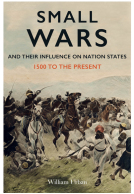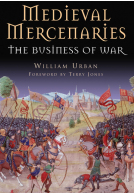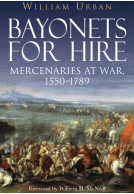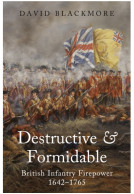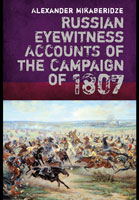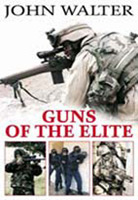Matchlocks to Flintlocks (Paperback)
Warfare in Europe and Beyond 1500–1700
(click here for international delivery rates)
Need a currency converter? Check XE.com for live rates
| Other formats available | Price |
|---|---|
| Matchlocks to Flintlocks eBook (3.5 MB) Add to Basket | £6.99 |
In the early modern world three dominant cultures of war were shaped by a synergy of their internal and external interactions. One was Latin Christian western Europe. Another was Ottoman Islam. The third, no less vital forrnso often being overlooked, was east–central Europe: Poland/Lithuania, Livonia, Russia, the freebooting Cossacks, a volatile mix of variations on a general Christian theme.rnrnWilliam Urban's fascinating narrative is an integrated account of early modern war at the sharp end: of campaigns and battles, soldiers and generals. Temporally it extends from the French invasion of Italy in 1494 to Austria's Balkan victories culminating in the 1718 Treaty of Peterwardein. Geographically it covers ground from the Low Countries to the depths of the Ukraine.
That narrative in turn focuses Urban's major analytical points: the replacement of 'crowd armies' by professionals, and the professionals' integration into crown armies: government-supervised, bureaucratised institutions. The key to this process was the mercenary. Originally recruited because the obligations of feudal levies were too limited, mercenary forces evolved operationally into skilled users of an increasingly complex gunpowder technology in ever more complex tactical situations. By the end of the seventeenth century, soldiers were identifying with the states and the rulers they served.
Originally published in hardcover in 2011, "Matchlocks to Flintlocks: Warfare in Europe and Beyond, 1500-1700" is now available in a paperback edition from Frontline Books. Featuring a number of illustrations, twenty-four pages of Notes, a six page bibliography of Readings, and a seven page Index, "Matchlocks to Flintlocks" is a superbly presented work of seminal historical scholarship and recommended as a core addition to personal, professional, community, college, and university Library European Military History collections and supplemental curriculum studies lists. It should be noted that now "Matchlocks to Flintlocks" is also available for students, academia, historians, and military history buffs in a digital book format.
Midwest Book Review
Read the full review here
Matchlocks to Flintlocks represents a fine work of military history of the era with a surprisingly broad scope. Unlike many studies of military history, the author's easy-to-read narrative style and macro-perspective provide a bug picture view of how changes in the way war was waged between 1500 and 1700 affected the world at large. Urban manages an excellent balance that ties his geographic locales farther afield back to the 'main stage' of Western Europe. Matchlocks and Flintlocks is an excellent choice as a broadly based work of military history aimed at a broader general audience. The result is a smooth narrative for the casual reader. The title is perfectly fitting, in its examples of the broad changes in technology, recruitment, supply, training, and leadership that occurred form 1500 to 1700. A narrative which laudably goes beyond the typical geographic focus on Western Europe. For the interested layperson or those new to the field seeking an overview of the influences on and changes within the state of warfare from 1500 to 1700, Urban has produced an exemplary book.
War in History
The author of this incisive history of warfare in Europe and east central Europe in the Lee L. Morgan Professor of history and international studies at Monmouth College, Illinois. In the early modern world three dominant cultures of war were shaped by a synergy of their internal and external interactions. One was Latin Christian Western Europe. Another was Ottoman Islam. The third, no less vital for so often being overlooked, was east-central Europe: Poland/Lithuania, Livonia, Russia, the freebooting Cossacks, a volatile mix of variations on a general Christian theme. Professor Urbans' fascinationg narrative is an integrated account of early modern war on the ground: of campaigns and battles, soldiers and general. Temporally it extends from the French invasion of Italy in 1494 to Austria's Balkan victories culminating in the 1718 Treaty of Peterwardein. Geographically it covers ground from the Low Countries to the depths of the Ukraine.
Classic Arms and Militaria
That narrative brings out the author's major analytical points; the replacement of 'crowd armies' by professionals, and the professional's integration into crown armies: government-supervised, bureaucratised institutions. The key to this process was the mercenary. Originally recruited because the obligations of feudal levies were too limited, mercenary forces evolved operationally into skilled users of an increasingly complex gunpoweder technology in ever more complex tactical situations. By the end of the 17th century, soldiers were identifying with the states and the rulers they served. This book will have a particular appeal for arms and armour collectors because it is written from the soldier's perspective. It charts the fighting man's transition from warrior to soldier and from soldier to servant of the state.
This is a very useful book, covering a somewhat neglected period and a much wider geographical area than is normally the case.
Historyofwar.org
About William Urban
WILLIAM URBAN is the Lee L. Morgan professor of history and international studies at Monmouth College in Monmouth, Illinois. He is considered a leading expert on the Crusades and the Teutonic Knights. His many books include Matchlocks to Flintlocks, Bayonets for Hire and the highly acclaimed The Teutonic Knights.










